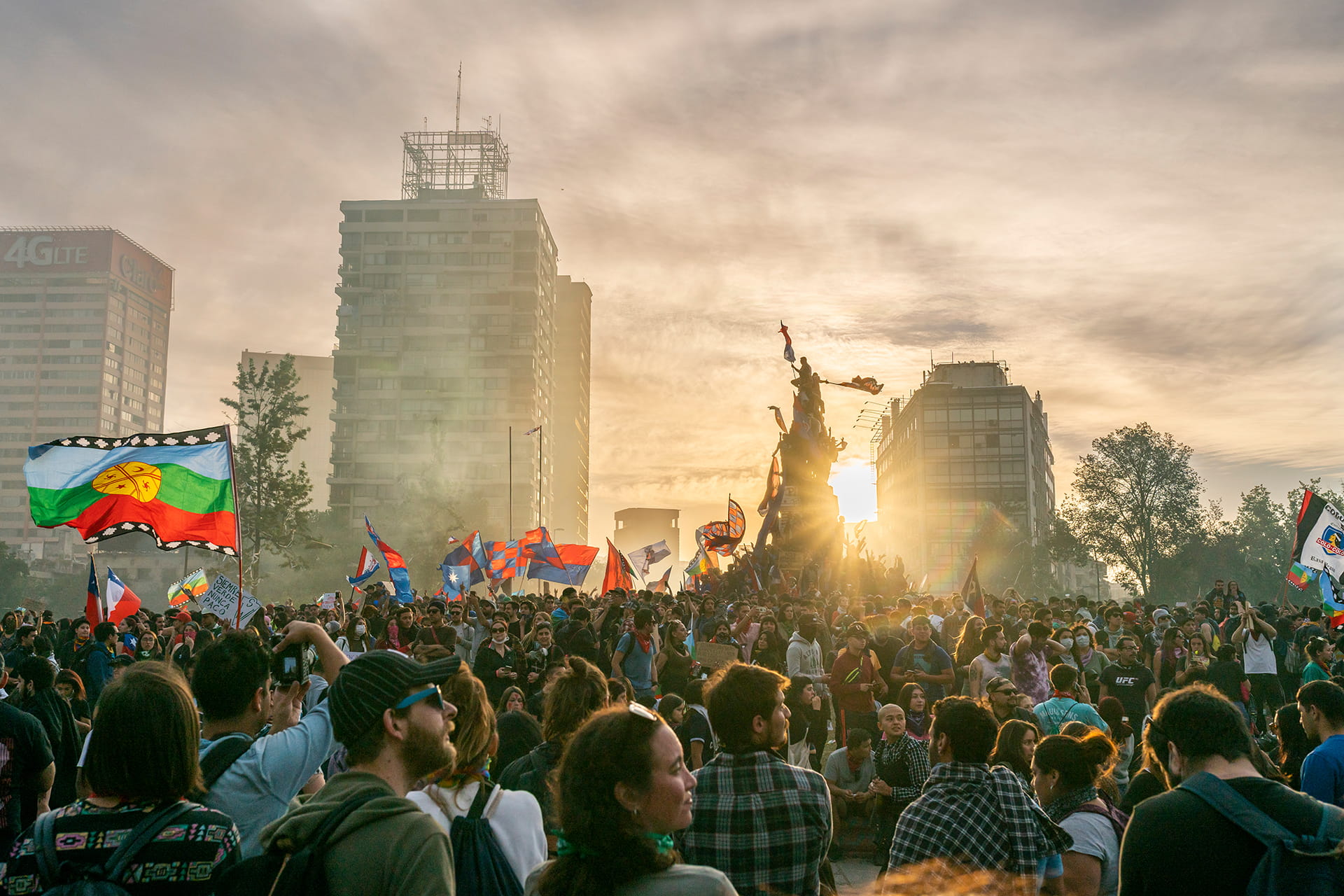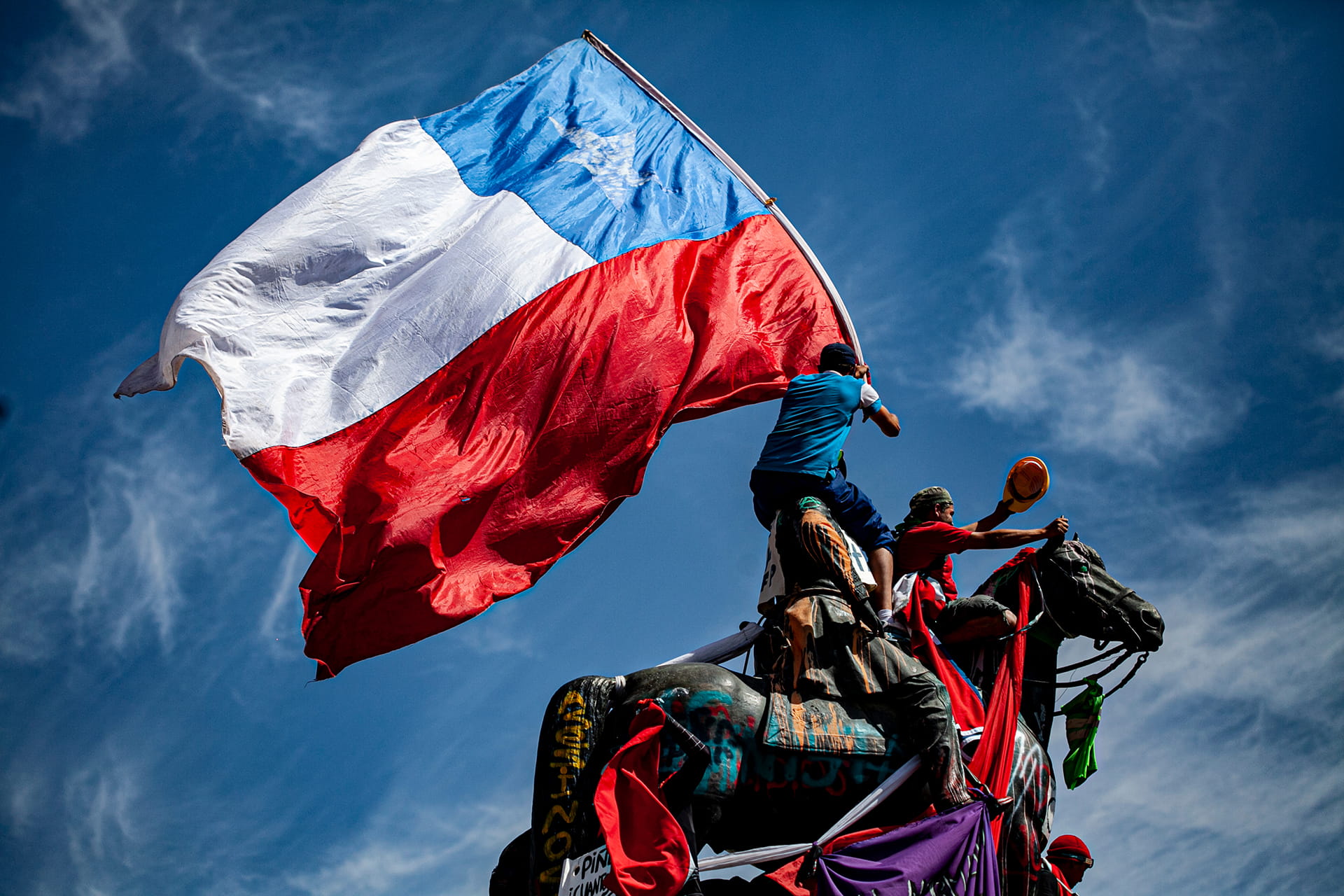A new collection of essays, co-published by our Human Rights Centre, focuses on the recognition of social rights as Chile designs a new constitution. Stephen Matthews, from our Communications Team, caught up with co-editor Dr Koldo Casla.
In October 2019, protests against fare increases on the public transport system in Chile’s capital, Santiago, escalated rapidly into a series of mass demonstrations. The protestors’ chant, “It’s not 30 pesos (£0.28), it’s 30 years”, provided an articulate expression of popular anger at the failure of successive governments to address the extreme inequality actively pursued by the dictatorship of General Augusto Pinochet Ugarte.
Calls for fundamental reform brought renewed focus on Chile’s 1980 Constitution, with the subsequent referendum and then the election of members of a new constitutional convention opening the door for a wide range of Chileans to participate in the design of a replacement, with the realisation of social rights a central demand of many.
A new publication, ‘Derechos Sociales y el Momento Constituyente de Chile’ (‘Social Rights and Chile’s Constitutional Moment’), presents a series of international and comparative perspectives on the various models used to support the recognition of social rights. Edited jointly by experts from the Universidad de Concepción of Chile, the Global Initiative for Economic, Social and Cultural Rights (GI-ESCR) and our Human Rights Centre, it brings together fifty academics and practitioners, half of them Chilean, with contributions also from a wide range of countries, including Argentina, Brazil, Colombia, Ireland, South Africa, United Kingdom and United States.
The book also presents extensive analyses of the possible articulation of social rights in Chile’s legal system.
It was published in Spanish on 27 September, with an English version to follow in 2022.
Dr Koldo Casla, from our School of Law and Human Rights Centre, is one of the book’s co-editors.

Briefly, what are economic, social and cultural rights, and what has their evolution been, within the wider context of human rights?
"Economic, Social and Cultural Rights (ESCR) include, among others, the right to work, the right to food, the right to housing, the right to water, the right to social security, the right to education, the right to health and the right to benefit from scientific progress. They are recognised in a number of international treaties voluntarily signed and ratified by most countries from all continents. The most important of those treaties is the International Covenant on Economic, Social and Cultural Rights (ICESCR), adopted in 1966. More than 170 countries are bound by ICESCR, including Chile since the treaty entered into force in 1976."
The recent history of Chile looms large in the debate over a new constitution. From a UK perspective, many will be aware of the brutal repression under Pinochet, but what has been the long-term impact of the economic policies pursued in that period?
"The structure of the Chilean economy imposed by the dictatorship in the 1970s and 80s is still in place in the 21st century. The economic system continues benefiting a few at the expense of the majority of the population.
"The 2019 protests unveiled serious cracks in Chile’s economic and social model. While new leaders have been elected in democratic elections in the last three decades, the socio-economic pillars that underpinned the military regime remain intact.
"Despite economic growth in recent decades, Chile has one of the highest rates of income inequality in the OECD, both in terms of income and wealth distribution, as well as one of the lowest rates of public spending."

Can we divorce the lack of economic and social rights now from the lack, historically, of political rights?
"One of the principles of international human rights law is that human rights are interdependent and interrelated, which means that one cannot pick and choose between them. While there are some outliers, societies with a poor record on socioeconomic rights tend to have a poor record on civil and political rights as well.
"We should recall that the popular movement that engendered the current constitutional moment in Chile back in October 2019 was received with severe repression by the authorities.
"A UN Human Rights Office team spent the first three weeks of November 2019 researching the situation across seven regions of Chile. The team’s report detailed extensive allegations –including specific examples– of torture, ill-treatment, rape and other forms of sexual violence by the police against people held in detention, many of whom appeared to have been detained arbitrarily. In all, according to official figures, more than 28,000 people were detained between 18 October and 6 December 2019. Chile’s Office of the Public Prosecutor indicated there were ongoing investigations into 26 deaths that occurred in the context of the protests, and the UN Human Rights Office said it had verified information concerning 11 of those 26 cases."
Why have subsequent regimes not been able to address these issues? Why, in a sense, does Chile need a new constitution?
"The 1980 constitution was an attempt by the regime to provide a veneer of legitimacy to the dictatorship. The constitution provided weak protection for human rights, with no specific bill of social rights and little or no regard for international standards. In the last four decades, however, international and comparative practice has strengthened the substance of these rights, providing valuable examples of how they could be enhanced at the constitutional, legal and policy level.
"The constitution has been amended several times, but the foundational principles have not changed, and the constitution remains below the standard in terms of protection of socioeconomic and environmental rights.
"The commitment to initiate a participatory process to change the constitution was key to the agreement between government, opposition and civil society groups to channel the energy of the social unrest of late 2019 towards constitutional reform.
"A referendum in October 2020 confirmed Chileans’ determination to elect a new constitutional convention to draft a new constitution. Representatives were elected in May 2021, and the convention began its proceedings in July. It is the first constituent assembly with guaranteed parity between men and women, as well as minimum guaranteed representation for indigenous people. One of the two co-chairs of the constitutional convention is Elisa Loncón, an academic of indigenous Mapuche descent who was born into poverty."
Why is the response to look at a new constitution, instead of targeted legislation?
"Chile’s constitutional moment is much more important than the mere reconsideration of the architecture of public institutions or the technical legal formulation of rights. This is an opportunity to revisit the foundations on which the Chilean society is built, the type of country and the sort of future they deserve."

Chile was a signatory to the International Covenant on Economic, Social and Cultural Rights under the Frei government, with the Covenant ratified under Allende. Pinochet clearly ignored the commitments made under that Covenant - did the international community challenge Pinochet on the specific breaches of this Covenant during his time in office?
"Chile signed ICESCR in 1969, under Frei, and ratified it in 1972, under Allende. The treaty entered into force for all countries that had ratified it in 1976, when Pinochet was in power.
"One of the most prestigious international lawyers, Antonio Cassese, wrote a report for the United Nations in 1978 under the title Study of the Impact of Foreign Economic Aid and Assistance on Respect for Human Rights in Chile. The report showed that most of the international economic aid and assistance helped to strengthen and keep in power a system that pursued a policy of systematic human rights violations. Cassese also provided evidence that, to obtain economic assistance, the government ensured that the economy favoured a wealth distribution detrimental for most of the population. In other words, economic assistance strengthened the regime and facilitated the perpetration of human rights violations, while the blood-soaked economic model attracted investments, lured by the resulting high profitability of neoliberalism’s first theatre of operations."
Has the current debate in Chile focused on the recognition specifically of economic, social and cultural rights?
"In 2015, the UN Committee on Economic, Social and Cultural Rights, which monitors States’ compliance with ICESCR, recommended that Chile should “guarantee the comprehensive recognition and necessary legal protection of economic, social and cultural rights” in a new constitution, “while ensuring that the constitutional reform process is conducted in a transparent and participatory manner.
"As indicated earlier, Chile is living its own constitutional moment, which began as a popular movement in 2019. From the perspective of socioeconomic rights, there are at least three reasons to be cautiously optimistic after the election of the constitutional convention in May 2021. Firstly, the right-wing alliance gained less than one third of the seats, which means that they won’t be able to block any constitutional amendment. Second, there was an unprecedented number of independent candidates, who are not affiliated with any mainstream party, many of them progressives. And finally, a significant proportion of the 155 representatives elected to the constitutional convention pledged to support strong social services, greater equality and labour rights."





